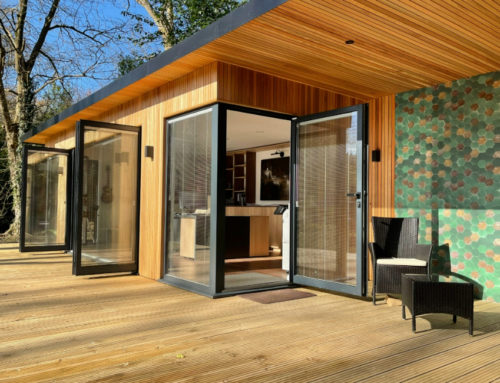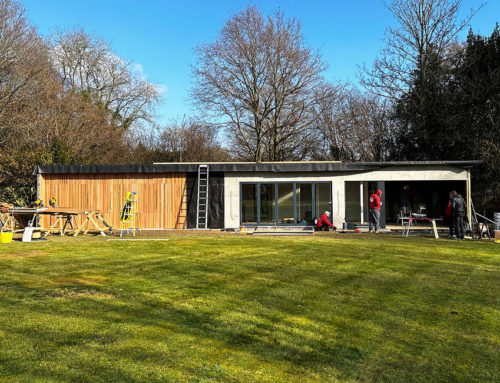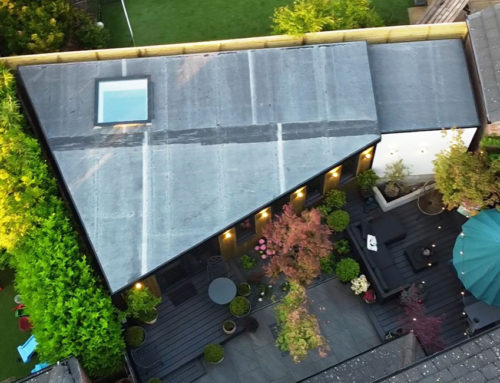When it comes to expanding your living space or adding a new structure to your property, understanding the nuances of different options can save you time, money, and potential headaches. Two popular choices for this purpose are annexes and mobile homes. While they might appear similar on the surface, there are crucial differences, especially in terms of planning permission, VAT rates, and other legal requirements.

Modern mobile home built without planning permission and designed to match the main house on the property in Surrey. This structure has one bedroom, one bathroom, walk-in wardrobe and large kitchen and living room. Built by A ROOM IN THE GARDEN in 2020.
Aesthetic and Quality Parity
First and foremost, it’s essential to recognize that annexes and mobile homes can be aesthetically similar and built to the same high-quality standards. Both structures can be designed to meet your specific preferences and requirements, ensuring they seamlessly blend with your property.
Planning Permission: Annexes vs. Mobile Homes
One of the most significant distinctions between annexes and mobile homes lies in the realm of planning permission. Annexes typically require planning permission from local authorities, which entails a thorough review of your project and adherence to local zoning regulations. This process can be time-consuming and may encounter resistance, particularly in protected areas or Areas of Outstanding Natural Beauty.
On the flip side, mobile homes enjoy a distinct advantage in this regard. They do not require planning permission, making them a more flexible option for property owners. Whether you want to place a mobile home in a protected area or a picturesque natural setting where obtaining planning permission might be next to impossible, mobile homes offer a practical solution.
VAT Rates: Annexes vs. Mobile Homes
Another financial aspect to consider is Value Added Tax (VAT). Annexes are subject to a 20% VAT rate, which can significantly increase the overall cost of your project. In contrast, mobile homes are subject to a 0% VAT rate, provided they include both a bathroom and a kitchen. This favorable tax treatment can make mobile homes a more cost-effective choice.

Modern mobile home with 2 bedrooms, 2 bathrooms, utility room and large kitchen and living room in Sussex. Built without planning permission in the back of the garden. Owners wanted to achieve modern industrial aesthetics by using corrugated steel on the facade of their new home. Built by A ROOM IN THE GARDEN in 2019.
Additional Differences
Here’s a quick overview of some other key distinctions between annexes and mobile homes:
Building Control: Annexes are typically subject to building control regulations, necessitating inspections and compliance with certain construction standards. Mobile homes, on the other hand, do not require building control oversight.
Ability to Relocate: Annexes are typically fixed structures and cannot be easily relocated. In contrast, mobile homes can be moved to different locations, providing greater flexibility.
Making the Right Choice
Choosing between an annexe and a mobile home ultimately depends on your specific needs, budget, and the regulatory environment in your area. If you value flexibility, a faster approval process, and a lower VAT rate, a mobile home might be the ideal choice.
For personalized advice and assistance with your project, it’s advisable to consult with experts who have experience in both annexe and mobile home construction – exactly like our company, A Room in the Garden. We can guide you through the decision-making process and help you realize your vision for the perfect garden building.
In conclusion, while annexes and mobile homes may look similar, the differences in planning permission, VAT rates, and other legal requirements can have a significant impact on your project. Understanding these distinctions will enable you to make an informed choice that aligns with your goals and budget. Whether you opt for an annexe or a mobile home, rest assured that both can be individually designed and built to a high-quality standard, providing you with a comfortable and attractive living space.



